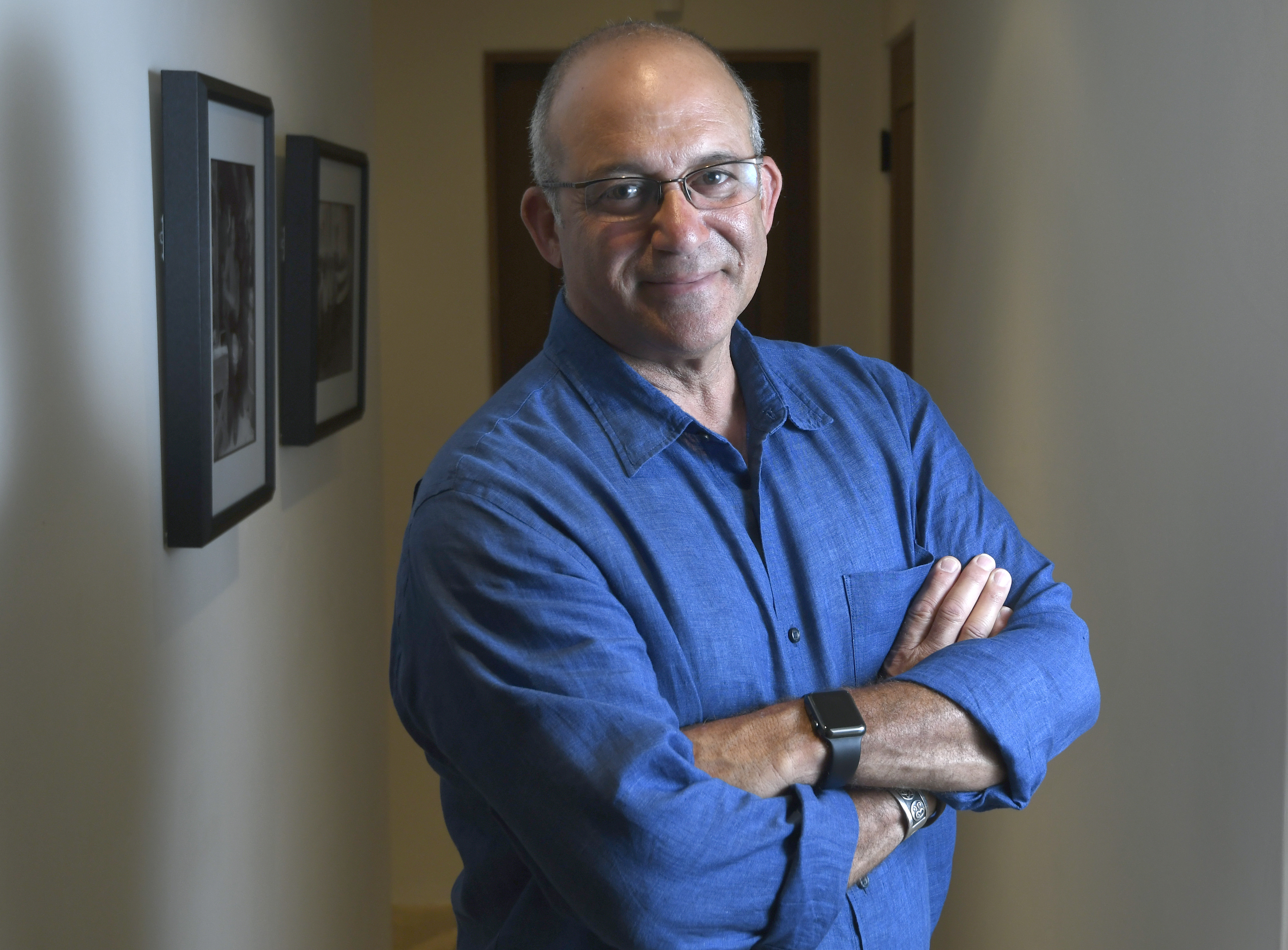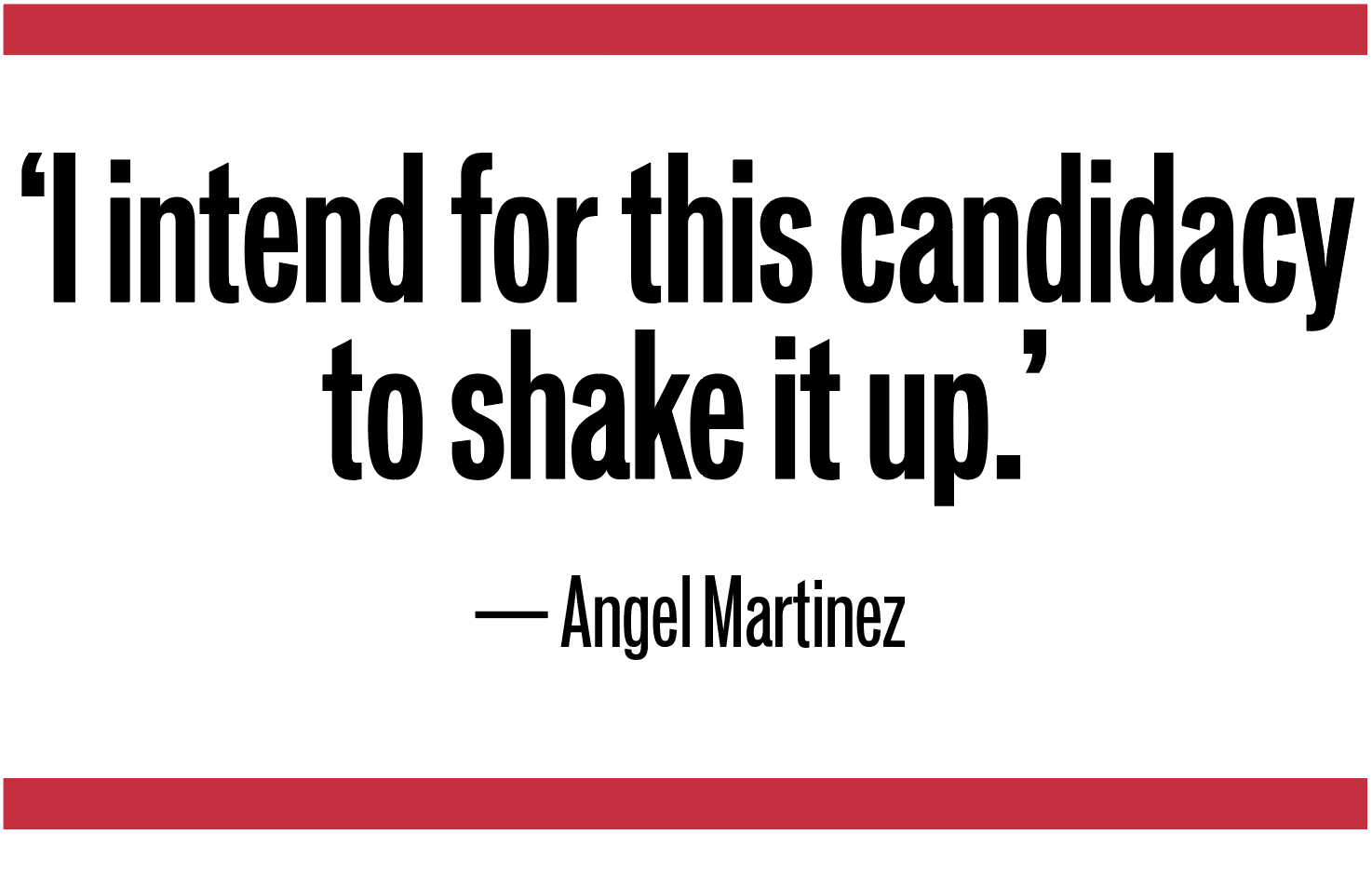Former Deckers CEO Angel Martinez Running for Mayor
He Has Big Plans for State Street, Santa Barbara Business

Angel Martinez isn’t interested in tinkering a fast or easy fix for State Street, the critical but sputtering engine of Santa Barbara’s economy. He wants to get his hands dirty and reengineer the whole machine so the city’s commercial corridor is back to firing on all cylinders. “We need a major re-visioning, or people are going to go bankrupt,” he said. “Let’s really understand what’s at stake here.”
It’s this mission, along with a desire to make Santa Barbara generally more embracing of business, investment, and its younger workforce, that inspired Martinez to join the mayoral race. He’s been quietly gathering support for months and will file his nomination paperwork August 8.
As the recently retired CEO of Deckers Brands, and still the chair of the board of the billion-dollar footwear empire, Martinez says he has the retail experience and business acumen to drive the State Street recovery and steer the city in a more sustainable direction. Otherwise, he worries, it will evaporate into a “geriatric wasteland.” “And I’m not trying to be derisive,” he said. “I’m soon going to be one of those geriatrics myself.” To do so will take take creative thinking and a clear plan of attack, he said, things that are missing among current City Hall leaders and his competition.
Martinez enters the mayoral race as the first and thus far only newcomer to the political arena. The other four candidates include three sitting councilmembers and a former mayor. Registered as a decline-to-state voter and critiqued as a rogue electron of Santa Barbara’s Democratic Party nucleus, he describes himself as an “Eisenhower Republican” who supports “the person over the party.”

On the one hand, Martinez views Santa Barbara’s strengths and challenges through a financial prism first, is critical of governmental red tape, and wants to better protect local property rights. On the other hand, Martinez is a famously generous giver to progressive causes, supported Hillary Clinton in the election, and as a Cuban immigrant raised on food stamps in the Bronx, is empathetic toward immigrants, speaking gratefully of the opportunities afforded to him under President Lyndon Johnson and his Great Society programs.
“I’ve actually run a business, a big business, and that’s why a lot of traditional Republicans in town are supporting me,” he said, declining to name names, but recent campaign mailers featured supportive comments from across the political spectrum, including Ron Gallo, CEO of the Santa Barbara Foundation; Ken Oplinger, president of the Santa Barbara Chamber of Commerce; Steve Gaines, dean of UCSB’s Bren School; and Lynda.com founder Lynda Weinman. “And as far as my historic progressive leanings go,” Martinez went on, “I’ll hold my record up against anybody.” He’s no fan of Trump and doesn’t worry about comparisons to the campaigns of business outsiders appealing to middle-class interests. “He’s the opposite of a businessman,” said Martinez. “He’s a disaster.”
Before Martinez joined the fray, Councilmember Frank Hotchkiss was the sole mayoral candidate with any clear conservative leanings. Now, Santa Barbara’s Republican Central Committee is circling the wagons. In an email sent this Tuesday, the committee called him and Clinton “one and the same” and declared Martinez is “not a Republican at all nor does he believe in Conservative values.” The message claimed Martinez is a strong supporter of sanctuary cities and believes “illegal immigrants who commit felonies should be allowed to stay in Santa Barbara.” It also said he wants to raise the city’s sales tax by 13 percent. (Currently at 7.75 percent, a sales tax ballot measure raises it one percent.)
Martinez didn’t waste time responding. “I never said anything to anyone about raising the sales tax,” he said in an email. “Anyone who says that is completely misrepresenting me.” He noted that he’s opposed to any tax increase sold as a solution to the city’s fiscal problems, particularly one that is not guaranteed to fund infrastructure improvement, like the ballot measure that will be before city voters this November.
“As far as sanctuary cities go,” he continued, “I have a moral aversion to separating families. I was separated from my parents and siblings for 34 years due to failed government policies, specifically the Cuban embargo and travel restrictions. No one knows what that is like unless they’ve lived it. So I won’t be lectured by anyone on that.” He concluded, “I am opposed to any criminal element being allowed in our country,” and brushed off Hotchkiss’s attacks: “I think I can speak to whatever issue Frank raises with more capacity, more capability, and more thought than he can.”
State Street’s long road to recovery will be difficult, said Martinez, but the solution isn’t rocket science either. Right now, he said, the downtown corridor, with its chain stores and mall-centric sensibilities, caters far too much to cruise ships and tourists and is even failing at that. “Look around on a busy weekend,” he said. “If it was working the way it’s supposed to work, you’d see people carrying shopping bags. But you don’t. You see them carrying a latte and a Pinkberry.” All-included dinner, drinks, and entertainment are back on the boat; hackneyed merchandise is cheaper online.
Instead, Martinez argues, State Street should court homegrown, imaginative merchants who offer a buying experience shoppers can’t get in a mall or on the internet and, even more important, make downtown an attractive hangout for city residents. “Look at Wolf’s Head,” he said. “You can go in and get a haircut, a shave, and buy some clothes. … That’s weird, but that’s what’s cool, and that’s what’s coming.” Martinez also singled out Make Smith Leather Company, behind Elsie’s Tavern on De la Guerra Street. “He’ll make your belt or your wallet or whatever you want while you’re walking a few blocks away … He should be on State Street.
To drive down rent prices, Martinez advocated for divvying the floor space of large, gaping holes like those left by Macy’s and penalizing property owners who won’t compromise on rates and leave spaces vacant for multiple years running. He pointed to Pearl Street in Boulder as a model of modernity and energy. He also suggested letting restaurants and retailers push out into the sidewalk, occasionally closing State Street to car traffic, and encouraging high-quality street performers.
Martinez commiserated with business owners troubled by homeless people loitering and panhandling outside. He said he would temporarily remove State Street’s benches to determine where and how much seating is actually utilized by shoppers, and he wants to implement what he calls a Care Not Cash program, where merchants, hoteliers, and other participants would collect Rescue Dollars that would be redeemable for certain items like shoes and other necessities. Martinez was hesitant about investing more in blanket services that he worries are bogarted by young transients who are houseless by choice.
Beyond the downtown strip, Martinez said he wants to make Santa Barbara a more viable option for recently graduated skilled workers who are too often lured away by other cities to start their careers. Sitting on the Bren School’s advisory board, he said, Martinez would routinely hear brilliant, environmentally minded business plans from graduate students who couldn’t then get a toehold in town. “What if the Bren School and UCSB — and Santa Barbara by extension — were to the environment what Stanford is to electronics?” he asked, suggesting the creation of an innovation hub on city airport property near the campus. “It would create exactly the kind of jobs that we need,” he said. “Because the jobs that we need are those that pay enough so that the people who want to contribute to the future of this city can afford to live here.”
Just as important, Martinez went on, is honoring past, slow-growth visionaries like Pearl Chase who made Santa Barbara special in the first place. It would be a mistake, he said, to disregard their conservation legacy. But, he stressed, the same strategies and mind-set that got Santa Barbara to where it is today aren’t going to move it forward in step with other successful communities. “I intend for this candidacy to shake it up,” he said. “I’m probably going to piss some people off. But what got us here won’t get us there. People have to be willing to accept that.”
Editor’s Note: This story was revised to state Republicans said Martinez supported a sales tax increase “by 13 percent,” not “to 13 percent.”



